Have you ever felt frustrated because your business just hasn’t taken off? I’ve totally been there myself.
Growing a business from zero to seven figures is no walk in the park. And most will fail to make it that far.
If you’ve been wondering why so many entrepreneurs don’t scale, keep reading.
There could be several reasons depending on the nature of the business, its capital, and other factors.
But the good news is that all these issues are all fixable!
In this article, I’ll share the 7 biggest reasons entrepreneurs struggle to scale their companies. I’ve seen these things over and over in the more than 20 years I’ve been in business and coaching other entrepreneurs.
More importantly, I’ll give you simple solutions to tackle each problem area.
So, if you’re ready to take your business to the next level, buckle up! Here we go.
Reason 1 Why Entrepreneurs Fail: Not Niching Down
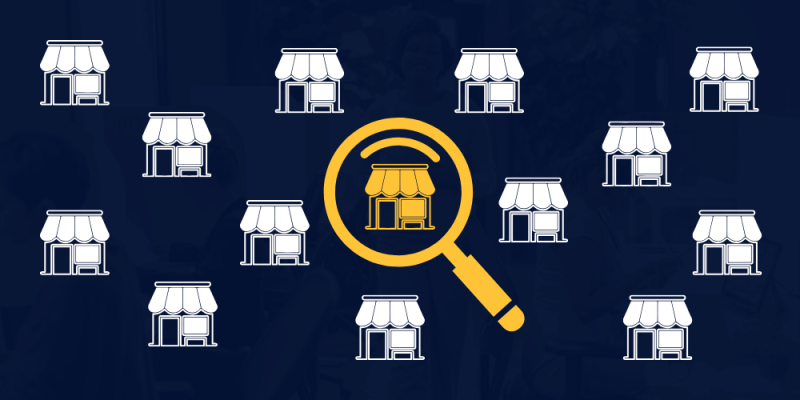
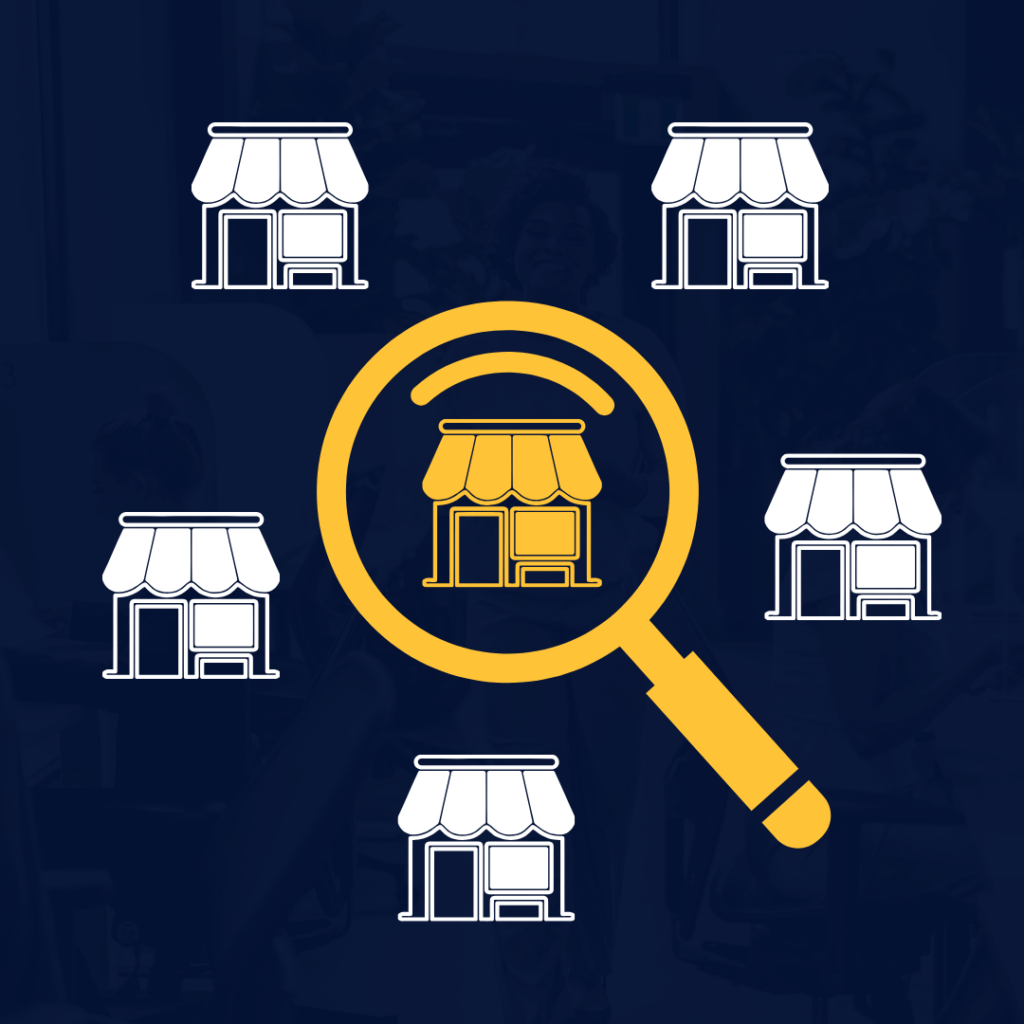
Most businesses fail to scale because they want to serve the broadest audience possible to make more sales. Rookie error!
When I talk to information marketers, for example, I always advise them to niche down. Ask yourself these questions:
“What niche am I in?”
“What’s the topic of my course?”
I tell them to make that niche micro, micro, micro.
The businesses that scale fastest laser focus on one micro-niche. They dominate that tight market before expanding out.
Here’s the truth: Trying to please everyone just makes you relevant to no one.
Let me share a real example that proves why niching down is so critical.
French entrepreneur Aurelian Amacker, founder of the marketing software company Systeme.io, understood the power of niche focus from the beginning.
His company now does over $5 million in recurring revenue. You can watch our full conversation on how he scaled his SaaS business below.
Offering an all-in-one marketing platform that replaced multiple tools and was 5-10x cheaper than competitors was a key competitive advantage of System.io. The entire platform was built by only 3 developers over 2 years, demonstrating that you don’t need a huge team to build a successful SaaS business.
Amacker didn’t start out trying to dominate the entire market. He began by niching down into the French market only. This tighter focus allowed him to fine-tune his platform and messaging.
After gaining traction in France, he expanded into the broader English-speaking market. But he always obsessed over specific user segments, never the general market.
It took his company 3.5 years to go from 1 to 1,000 customers in the English-speaking market, showing how hard it was initially to gain traction. But growth then accelerated rapidly after reaching 1,000 customers.
Amacker says niche focus was key to competing as a startup in a crowded space. By relentlessly focusing on serving specific customer needs better than anyone else, he found success without a huge budget.
His story proves that niching down gives you the freedom to tailor your product, marketing, and positioning precisely. You can become the go-to solution for a narrowly defined audience segment.
This seemingly small shift makes a night-and-day difference in how easily your business can scale. So, take some time to research and find your ideal niche. It’ll unlock massive growth down the line.
Reason 2 Why Entrepreneurs Fail: Skipping the Stages of Scaling (The Empire Formula)
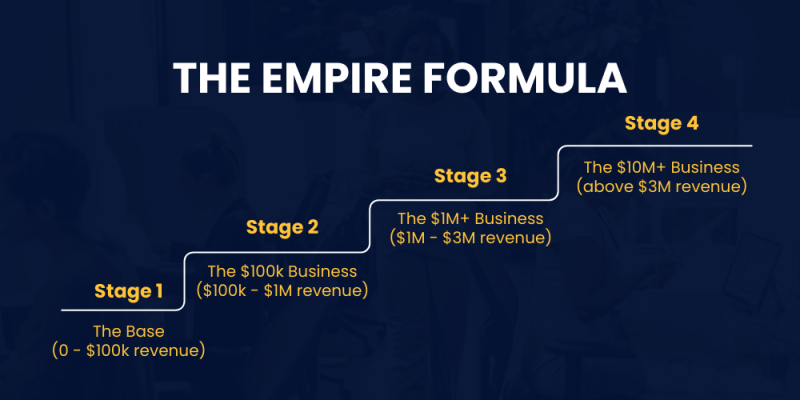
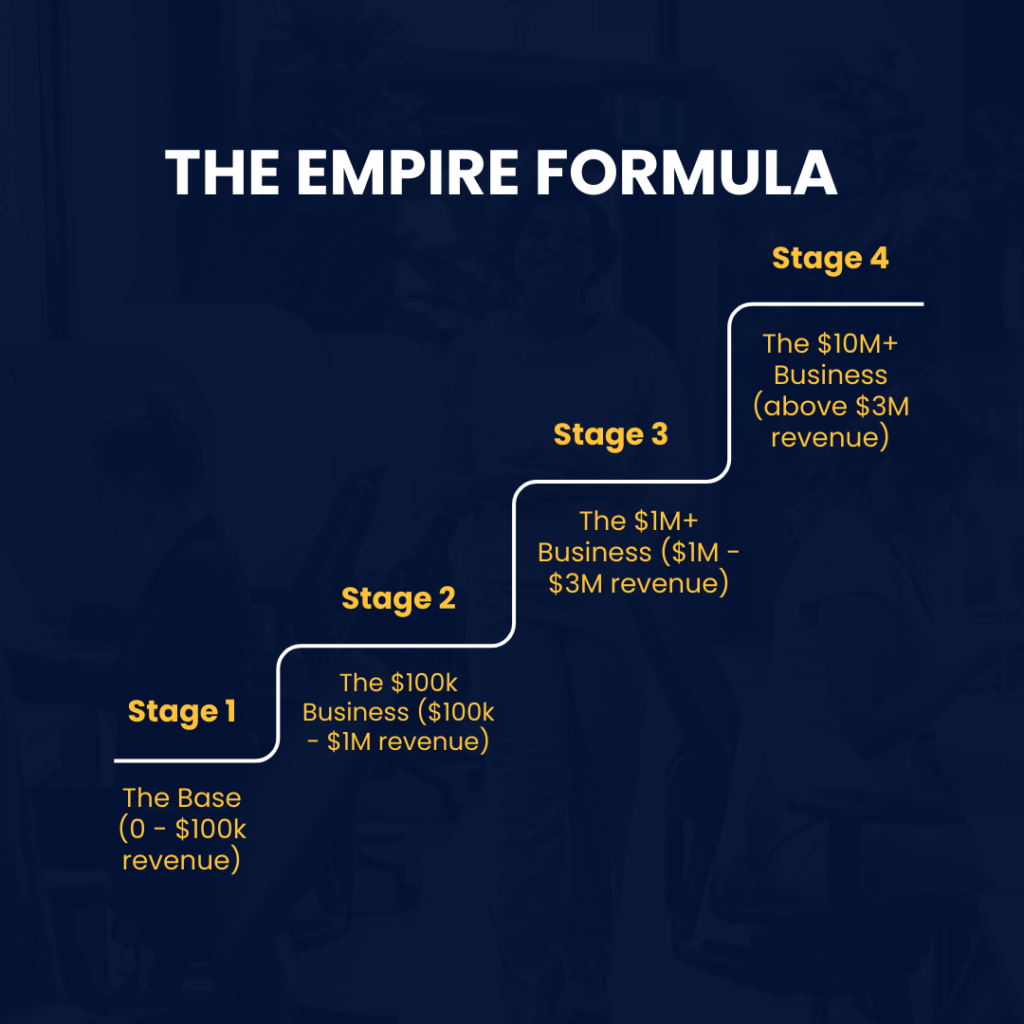
Here’s a common but disastrous mistake:
Businesses just starting out focus time, energy, and money on learning marketing tactics like paid ads and sales funnels. But, using these strategies right out of the gate is a recipe for disaster.
Trust me, don’t do paid ads if you’re just starting!
That’s the kiss of death for your business at the early stage.
Instead, let me give you a blueprint when scaling: The Empire Formula.
This is my 4-stage formula that can help you see what things and tactics you should focus on at each stage of your business to scale effectively.
I talk through the details in this video but keep reading for the highlights.
Stage 1 - The Base ($0 - $100k revenue)
Focus on niching down, creating a minimum viable product, testing demand, and building your audience.
Stage 1 is all about getting used to things and figuring out what works for your audience.
Most businesses spend around 4-7 months in Stage 1. Others may take as long as 2 years or more.
But it totally varies! I’ve seen some blow past it in just two weeks (though that’s pretty uncommon).
But here’s a funny thing: in stage one, you should not have funnels, you should not do paid media, and you should not focus on an excellent copy.
All you should focus on is getting a good product done and quickly pushing it out to the market for testing.
Stage 2 - The $100k Business ($100k - $1M revenue)
Now focus on creating sales funnels, improving copywriting, and making initial hires.
Stage 2 is where you can start worrying about funnels.
See, one of the cool things about funnels is you can instantly double or triple your revenue. So if you’re making $100k in Stage 1, a funnel could boost your revenue to to $300k!
You’ll also want to level up your copywriting at this stage. Hire your first killer copywriter to make your sales messages pop. You can afford it now, thanks to those initial profits!
Stage 3 - The $1M+ Business ($1M - $3M revenue)
Expand your product line based on audience demands. Add paid traffic now that you have funnels and an audience.
Your goal here is to offer your audience more ways to work with you. Launch continuity programs, online courses, coaching programs, and events.
This is also when you begin dipping your toes into paid traffic. Start small with Facebook Ads, influencers, and native ads to validate them. Then scale up what works.
Stage 4 - The $10M+ Business (above $3M revenue)
Pour more paid traffic into your proven funnels and products. This is when heavy paid ad spending begins.
By Stage 4, you’ve got a well-oiled money machine cranking out over $3 million per year. Time to pour some gasoline on that fire!
Increase your paid traffic budget and diversify into multiple channels. We’re talking next-level Facebook targeting, paid search, YouTube…the whole enchilada.
Rapidly expand your funnels and products now that your model is proven. And keep obsessively testing and tweaking those funnels for sky-high conversion rates.
If you want to get really aggressive, look at TV, radio, and offline advertising.
Before you know it, you’ll be joinin’ the $10 million club. Not too shabby!
The Key to Progress
Now that you have an overview of what happens at every stage, my advice is don’t skip stages.
The key is to progress through each stage systematically by mastering the fundamentals like audience building and copywriting before moving to more advanced strategies like paid ads.
Jumping ahead before laying the proper foundation for your business only leads to issues scaling up.
Reason 3 Why Entrepreneurs Fail: You’re Scared to Invest in Growth


Many entrepreneurs have a scarcity mindset. They resist investing in things like contractors, advertising, and product development.
I’ve been there too.
But let me tell you this…
If you don’t spend money to make money, you’ll stay small forever. Think of investments as rocket fuel for your liftoff.
Here are some proven ways to fund that growth:
- Allocate some of your early profits – Once you’re making a consistent profit, reinvest a portion of it back into high-ROI activities. For example, I used our first $50k in profits to hire an amazing copywriter who increased our conversions by 5X. That quickly paid for itself.
- Take on investors – Angels or VCs can inject large capital quickly in exchange for equity. One of my friends raised $500k from an angel, which allowed him to build his prototype and get to market much faster.
- Get revenue financing – Options like merchant cash advances or revenue-based financing give you non-dilutive capital based on your recurring revenue stream. I used this to finance about $200k in paid ads that grew my revenue from $ 2M to $5M.
- Use crowdfunding – Platforms like Kickstarter or Indiegogo let you raise smaller chunks of capital from your engaged audience. A colleague of mine funded the launch of her online course through $75k in pre-sales from crowdfunding.
With the right funding, you can quickly expand your team, advertising reach, product releases, and more. The investment pays for itself down the road.
Reason 4 Why Entrepreneurs Fail: Lack of MVP Testing
Before I built any product, I would create a super simple MVP.
An MVP is a “minimum viable product.” It’s a basic version of your product or offer. The key purpose is to put something in front of real customers for feedback as quickly and cheaply as possible.
Testing your MVP helps validate and invalidate key assumptions about your product before you overbuild features people may not even want.
This one step alone could prevent you from wasting months or years on the wrong ideas.
Believe me, it’s a lot easier to pivot early on rather than after your product launches.
Don’t be afraid to put your riskiest assumptions to the test. MVP experiments let you refine your offering with real-world feedback. And it’s a low-cost, low-risk way to validate you’re on the right track before scaling up.
Reason 5 Why Entrepreneurs Fail: Not Building an Audience
Here’s a fact: an engaged audience is the most valuable asset any business can have.
But too often, entrepreneurs put all their energy into the wrong things. They neglect community building. Huge mistake!
Let me tell you from experience – it’s 10x easier to scale your business when you already have an audience excited to buy your next launch.
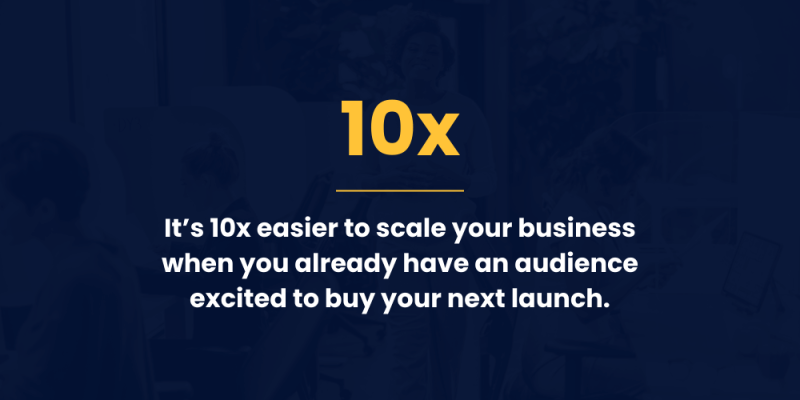
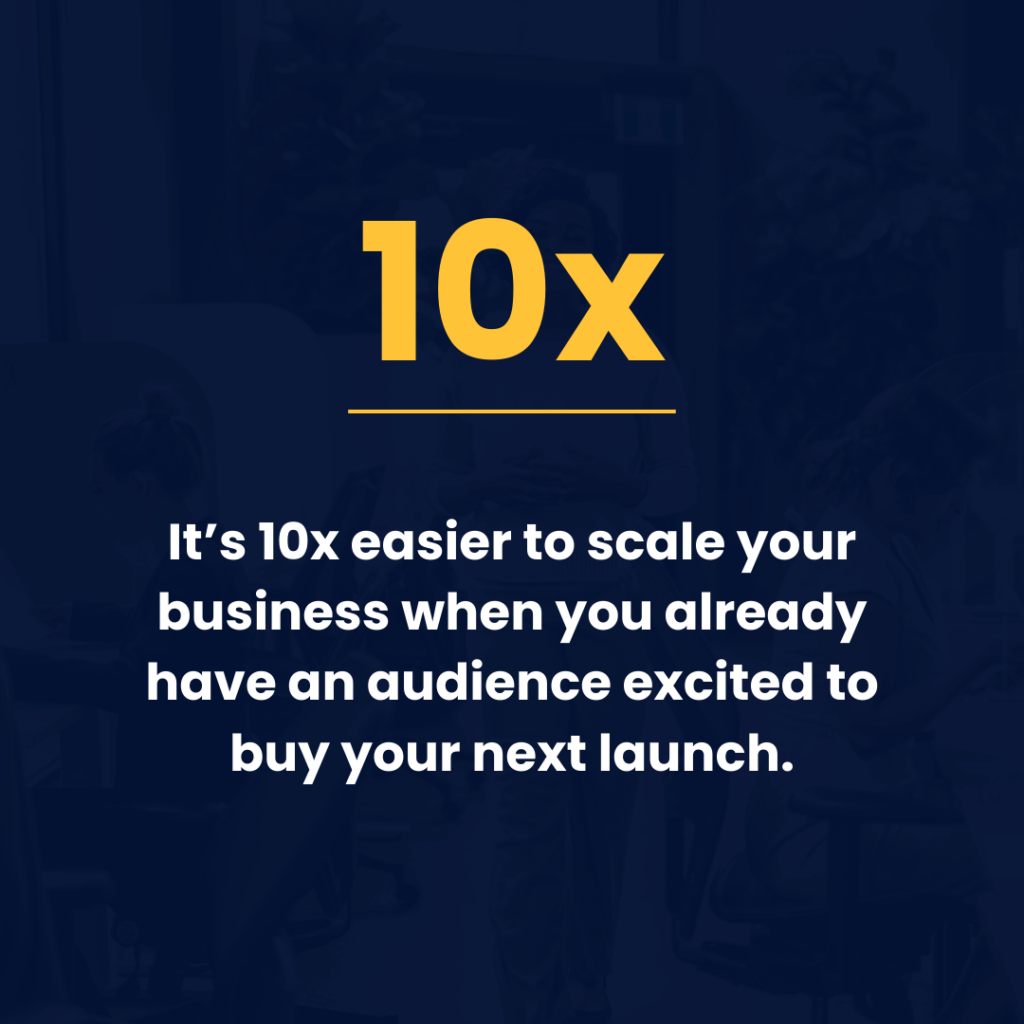
Marketing agency owner, Mike Buontempo knew exactly how crucial building an audience is, so he doubled down on his organic marketing on Facebook. Within a year, he was able to scale his business from 5 to 25 clients. This growth was generating over $100k in monthly revenue for his agency.
So, don’t wait to build your audience! Start sharing VALUABLE content far in advance through platforms like:
- Facebook groups – Build a sense of community and give followers value
- YouTube – Share videos, tutorials, and insider tips on your niche
- Podcasting – Deep industry interviews build awareness and expertise
- Instagram – Short clips and user-generated content engage followers
No matter what channels you use focus on building genuine connections with potential customers from day one. Answer their questions. Share your expertise freely. Offer to help them.
Nurture that community consistently, and they’ll become your army that wants to support all of your future offers. You’ll have a baked-in audience ready to scale your revenue from day one.
Reason 6 Why Entrepreneurs Fail: Not Investing in Yourself

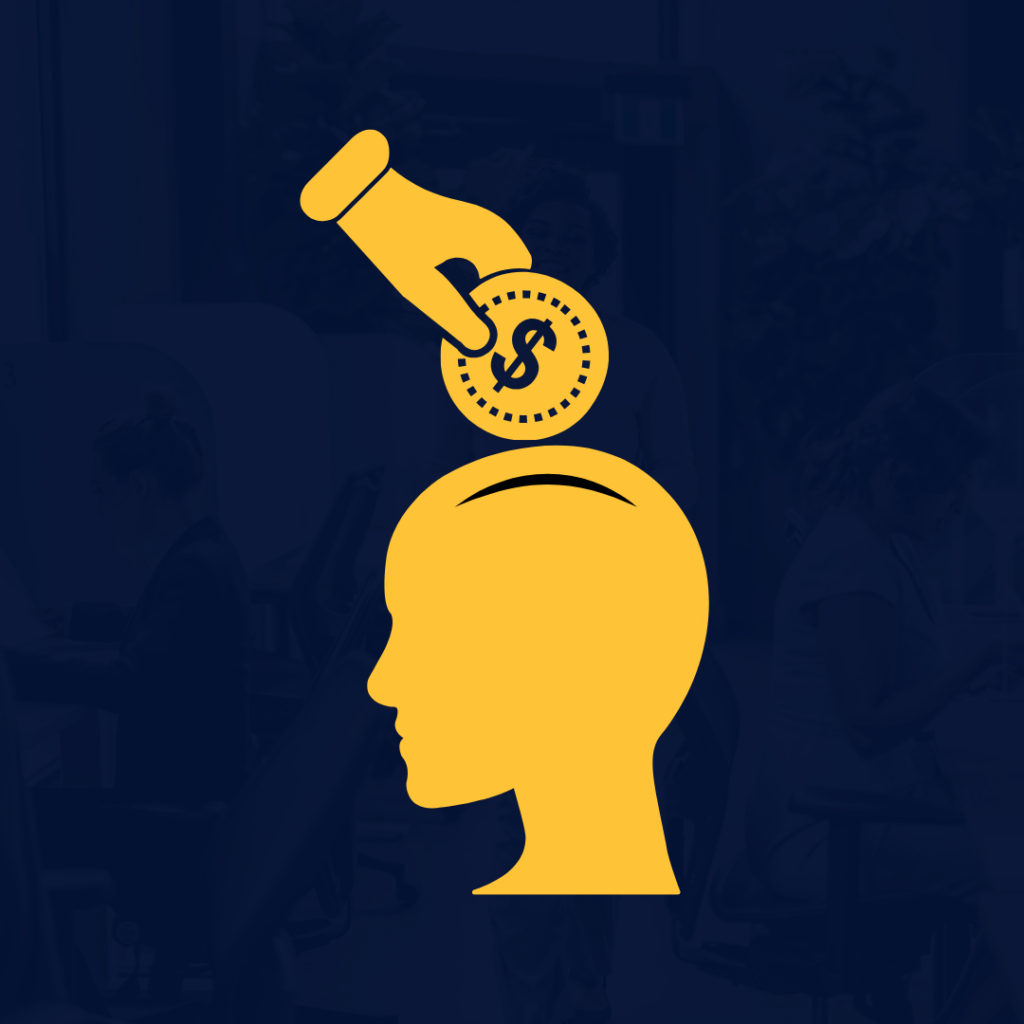
When I first started my entrepreneurial journey, I tried winging it instead of properly investing time and money to educate myself.
Let’s just say things got ugly…
Because I didn’t understand core concepts like digital marketing, sales funnels, copywriting, or customer psychology, I made every amateur mistake in the book.
But after finally investing substantial time and money in things like courses, coaches, books, and masterminds, my business completely turned around.
For example, I was struggling to get traffic, so I took a full 12-week digital marketing course for $997.
Although it was a big investment for me at the time, the key concepts I learned allowed me to 3X my organic traffic within 2 months of finishing the course. That quickly paid for the entire program cost and then some.
Here are some other great resources any entrepreneur can use to get smart fast:
- Read Traction by Gabriel Weinberg – it provides an incredible blueprint for scaling companies rapidly
- Take free digital marketing courses online – there are endless top-notch ones available
- Hire targeted mentors or coaches in your niche – the expertise you gain is easily worth 10x what you pay them
- Attend masterminds and industry events (like Expert Summit)- this gives you huge networking and partnership opportunities
The bottom line is: that knowledge is power. Successful entrepreneurs never stop growing their expertise. They invest time and money regularly in their own development.
Even if you think you know it all, there are always new best practices, technologies, and strategies emerging. Invest in your own growth as much as you invest in your business. Your success depends on it!
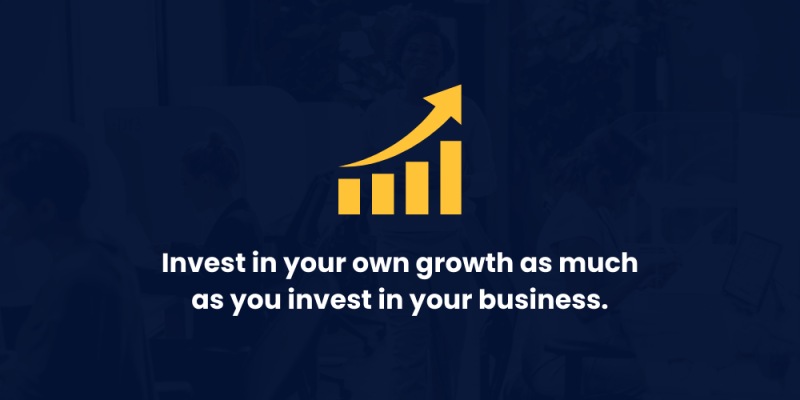
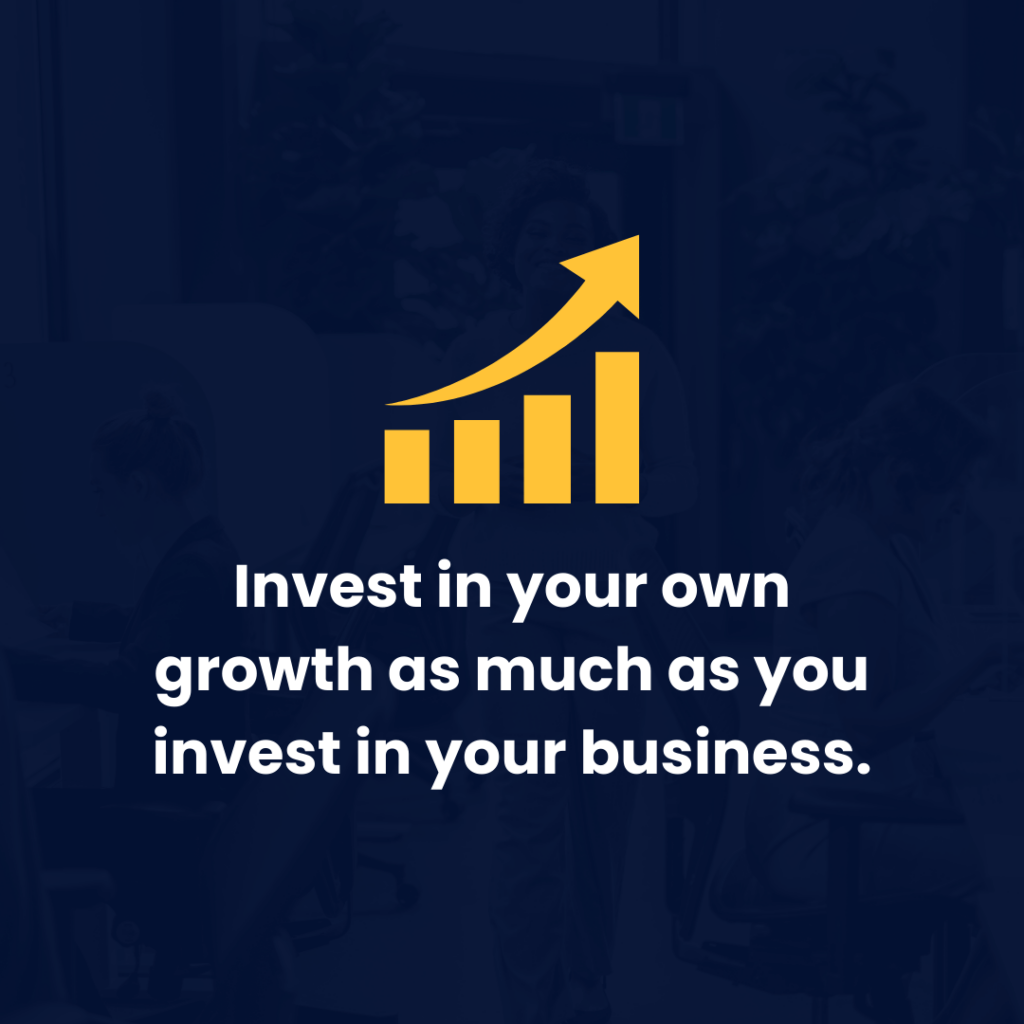
Reason 7 Why Entrepreneurs Fail: Not Having a Support System
Entrepreneurship can be a lonely journey. Working in isolation has been cited as one of the issues many entrepreneurs face as they try to do everything on their own.
But surrounding yourself with talented mentors, peers, and coaches changes everything.
Having this personal “dream team” provides incredible benefits including:
- Guidance from experts – Getting advice from successful mentors helps you avoid mistakes and accelerate growth. Their real-world insights are invaluable.
- Accountability – Reporting to a mastermind group or advisor keeps you focused and on track when times get tough.
- Motivation – Peers and colleagues inspire and encourage you during the ups and downs of entrepreneurship.
- Troubleshooting – Running into roadblocks is inevitable. Advisors suggest creative solutions.


Here are some proven ways to start building your support squad:
- Join a business mastermind group – Learning alongside peers who face similar challenges is hugely rewarding.
- Reach out to successful founders or experts in your niche – Most are happy to mentor you if you politely ask.
- Attend local entrepreneur networking events – Great way to meet potential partners and team members.
- Join Facebook communities for entrepreneurs – This allows you to crowdsource feedback and advice.
The bottom line is this – who you spend time with shapes who you become. Carefully choose the mentors and people in your support system. They’re the ones that expose you to fresh perspectives, expertise, and inspiration.


Surrounding yourself with talented people who have already achieved what you want to do provides a model for your own success. You expand your knowledge, mindset, and possibilities.
Even if you’re an introvert (many entrepreneurs I’ve met are), make the effort to intentionally build your inner circle. It will fuel your growth in ways you can’t even imagine right now.
Take Action
There you have it – the seven biggest reasons scaling fails for entrepreneurs and how to tackle them!
Here’s a quick recap…
To scale your business:
- Niche down
- Follow The Empire Formula
- Invest in growth
- Test your MVP
- Build your audience
- Educate yourself
- Surround yourself with support (mentors, coaches, people that inspire you)
I hope these lessons help you avoid the common pitfalls in scaling and take your business to new heights.
If you take just one key takeaway from this, let it be this:
You absolutely have the power to grow your business as big as you desire. You just need the right roadmap and mindset.
Trust the process, get support, and move forward one step at a time. Rome wasn’t built in a day, and neither is a profitable business! But with consistent effort, you will get there.
Now I’d love to hear from you! Join the free Expert Scale Facebook group and let’s continue the chat! Share your experiences, or ask advice from our awesome supportive community of entrepreneurs who are absolutely crushing it in their niche!
Click here to join our free Facebook group today.